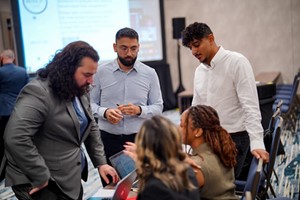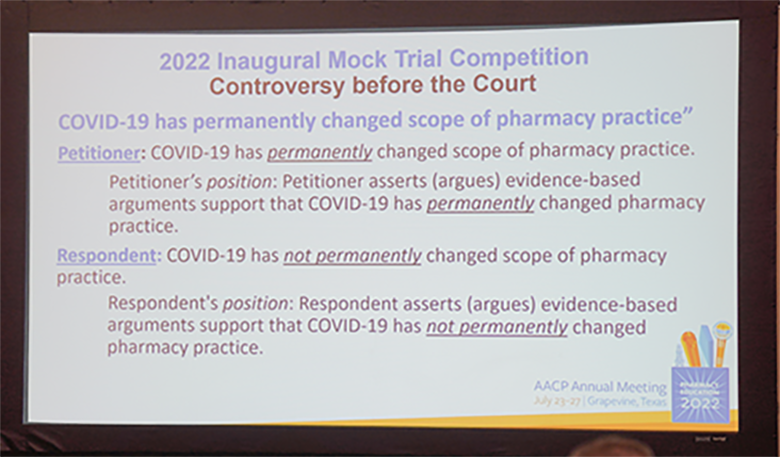AACP’s Mock Trial Competition provides an opportunity for student pharmacists to enhance advocacy skills as they collaborate to address healthcare challenges.
By Dr. Ettie Rosenberg and Dr. Hoai-An Truong
 Seeking to expand development opportunities in advocacy and debate for student pharmacists across the Academy through active learning and innovation, the AACP Continuing Professional Development (CPD) Section supported and facilitated an Inaugural Mock Trial Competition in 2022 and continued the initiative into 2023. The mock trial project (MTP), first implemented in 2015 at the West Coast University School of Pharmacy, has evolved into a collaboration with the University of Maryland Eastern Shore over the past nine years. In addition to having been published and presented at several conferences, the mock trial also won Honorable Mention at the AACP Innovation in Teaching Competition in 2017. AACP recognized the development and implementation of the MTP in its first two iterations (2015-2016). This innovative teaching and learning strategy reinforces evidence-based practice skills and affective domain competencies in the Center for the Advancement of Pharmacy Education (CAPE) 2013 Outcomes and Accreditation Council for Pharmacy Education (ACPE) Standards 2016. Recently, the mock trial initiative has been updated to reflect the COEPA 2022 and ACPE Standards 2025.
Seeking to expand development opportunities in advocacy and debate for student pharmacists across the Academy through active learning and innovation, the AACP Continuing Professional Development (CPD) Section supported and facilitated an Inaugural Mock Trial Competition in 2022 and continued the initiative into 2023. The mock trial project (MTP), first implemented in 2015 at the West Coast University School of Pharmacy, has evolved into a collaboration with the University of Maryland Eastern Shore over the past nine years. In addition to having been published and presented at several conferences, the mock trial also won Honorable Mention at the AACP Innovation in Teaching Competition in 2017. AACP recognized the development and implementation of the MTP in its first two iterations (2015-2016). This innovative teaching and learning strategy reinforces evidence-based practice skills and affective domain competencies in the Center for the Advancement of Pharmacy Education (CAPE) 2013 Outcomes and Accreditation Council for Pharmacy Education (ACPE) Standards 2016. Recently, the mock trial initiative has been updated to reflect the COEPA 2022 and ACPE Standards 2025.
This self-directed team activity requires participants to apply knowledge (literature evaluation, research design and critique, evidence-based practice and decision-making); skills (critical thinking, communication, debate, advocacy); and attitudes (collaboration, professionalism, leadership, self-awareness) gained from the Pharm.D. curriculum and co-curriculum. Student teams from participating pharmacy programs are assigned a controversial topic in pharmacy practice, pharmacotherapy, healthcare and/or public health that impacts the pharmacy profession.
Honing Critical Thinking
Student teams across all Pharm.D. programs were invited to submit letters of intent with an application package to be considered and selected for opening rounds of the virtual mock trial competition (as semifinalists). In both 2022 and 2023, a panel of judges reviewed all submission packets and narrowed down the eligible teams to four semifinalist teams. For the semifinal rounds, the four selected programs (teams) were randomly paired to compete in each of two virtual mock trial debates on an assigned topic. Each team received a random designation as proponent (“Petitioner”) or opponent (“Respondent”). Pharmacy schools sponsored student teams to compete.
“As the faculty advisor for the virtual mock trial, witnessing my students confidently present arguments using primary literature before a panel of judges was exhilarating,” said Dr. Lauren Caldas, associate professor, Department of Pharmacotherapy and Outcomes, at the Virginia Commonwealth University (VCU) School of Pharmacy. “Through this self-directed team activity, I was able to witness my students apply knowledge, skills and devotion to patient care to passionately debate controversial topics impacting the pharmacy profession, showcasing their critical thinking, communication and leadership abilities.”

Teams are challenged to research, evaluate and critique the evidence they identify, develop best arguments for their respective team/position based on the evidence and prepare to debate their respective positions (“for” or “against”) on the assigned topic during the virtual mock trial. Students must collaborate on every aspect of their mock trial strategy as they develop the strongest arguments to support their team position on the specified mock trial issue. “I enjoyed seeing everyone’s individual strengths and interests come together for this competition. It highlighted the importance of interdisciplinary collaboration when making large-scale healthcare decisions,” said Josephine Gresko, a Pharm.D. candidate at VCU who participated in the 2023 competition.
The virtual mock trial was enacted before a panel of judges. After the first round, the top two teams (finalists) were invited to face each other and compete in person for the final round at the AACP Annual Meeting in July 2022 and 2023. Dr. Stephen A. Brown, associate professor, Department of Pharmacy Practice, Samford University McWhorter School of Pharmacy, served as a judge in 2022 and 2023. “Each year I am extremely impressed with the students’ ability to marshal the evidence and present reasoned arguments to the judges,” he noted. “They do this with a level of professionalism that instills me with confidence in the future of the pharmacy profession.”
The AACP CPD Section is launching the 2024 Third Annual AACP Mock Trial Competition. Schools are invited and strongly encouraged to sponsor a student team to represent their institution. The top two teams will advance as finalists to compete in person during the 2024 AACP Annual Meeting in Boston, with the final competition scheduled for Saturday, July 20. The winning team will receive $500, courtesy of the CPD Section. The names of the two finalist teams will be recognized with those mock trial finalists from prior years. For more detailed instructions and information about the submission deadline and the 2024 debate topic, visit the AACP Mock Trial Competition website: bit.ly/AACPMockTrial.
Dr. Ettie Rosenberg is assistant dean of student affairs and a professor in the Department of Pharmacy Practice at the West Coast University School of Pharmacy. Dr. Hoai-An Truong is a professor and the director of public health at the University of Maryland Eastern Shore School of Pharmacy and Health Professions.

